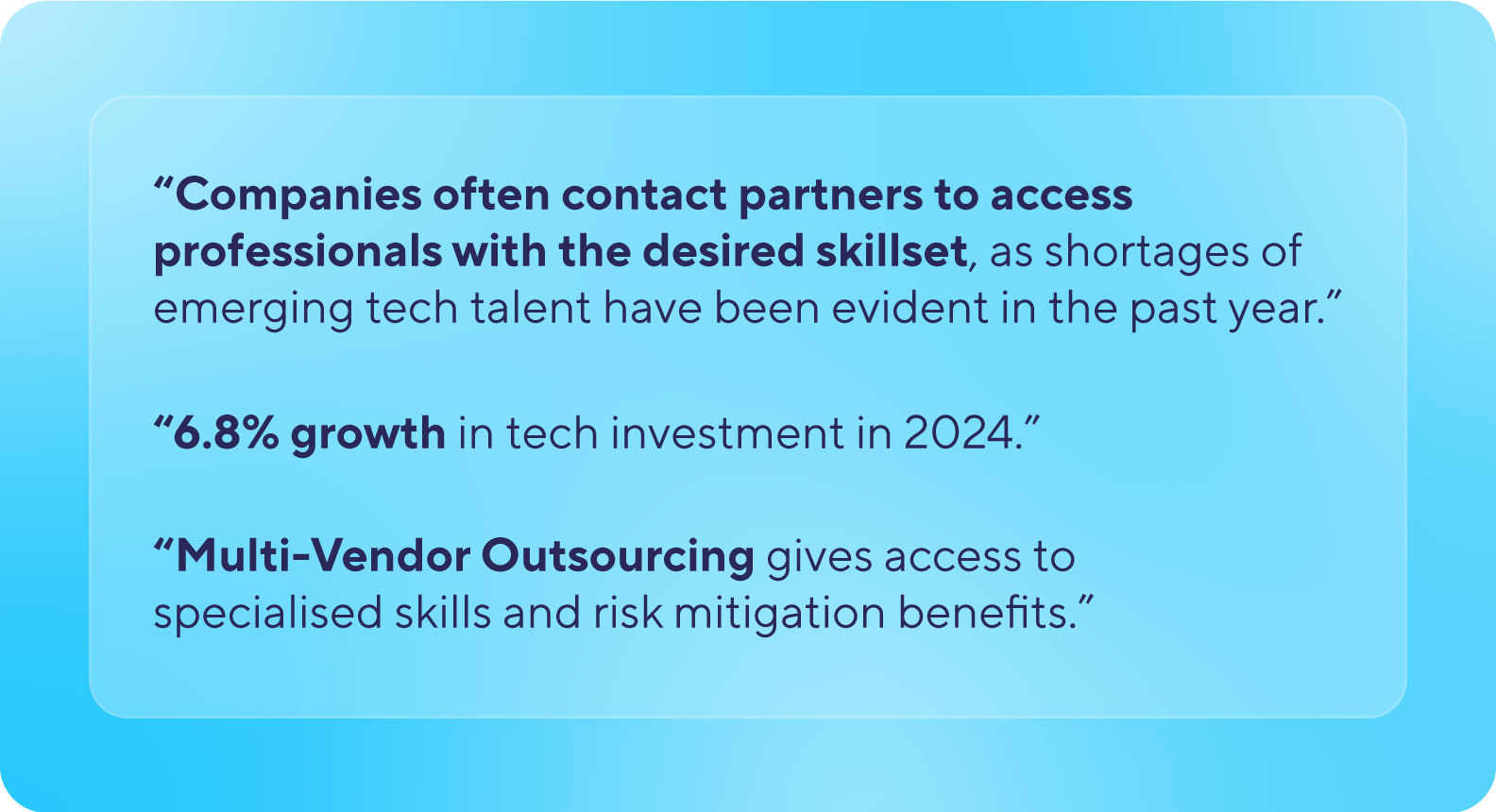In the ever-evolving landscape of technology, businesses are continually seeking innovative ways to manage their IT needs. The global IT outsourcing sector is not just a trend; it’s a dynamic field adapting to the industry’s evolving demands. As we approach 2024, businesses must stay ahead by understanding and leveraging the latest trends in IT outsourcing. In this blog post, we will share our insights about the key outsourcing trends that are set to shape the IT landscape in the coming year.
Emerging Roles
As technology advances, new roles are surfacing in the IT outsourcing domain. Quantum Computing Specialists, Augmented Reality Designers, UX/UI Designers, DevOps Engineers, Content Creators & Strategists, AI Developers, Low-code/No-code Developers, Sales Process Architects, and Automation Experts are the trailblazers in demand. Each of these roles plays a pivotal part in addressing the diverse and complex needs of businesses in the digital era. Companies often contact partners to access professionals with the desired skillset, as shortages of emerging tech talent have been evident in the past year.

Trending Technologies
The IT outsourcing industry is heavily influenced by cutting-edge technologies. Blockchain services, Machine Learning Automation, Cybersecurity, and Artificial Intelligence (mainly GenAI) have been at the forefront of technological advancements in recent years, and their influence will only get bigger in 2024. The integration of these technologies into various business processes not only optimises operations but also ensures efficient issue resolution.
Remote Work Model
Working from home, widely spared during the pandemic, is here to stay. As the world becomes more interconnected, businesses recognise the benefits of increased flexibility and productivity. The demand for remote positions is expected to surge, prompting companies to adopt strategies that facilitate seamless collaboration and communication within globally distributed teams. According to Gartner [1], the growth in tech investment is predicted to be around 6.8% in 2024, so it is only logical to tie the tech spending budget limitations with remote talent outsourcing.
Eastern Europe’s Influence
Eastern Europe is a significant player in the IT outsourcing arena with a stable business climate. Countries like Bulgaria, Georgia, Albania, and Romania, with their cost-effective and skilled professionals, are preferred spots for outsourcing. The region’s potential draws attention from businesses seeking high-quality services at competitive rates.
Increasing Use of Artificial Intelligence (AI) and Automation
AI and automation are no longer just buzzwords, but integral to the outsourcing landscape. From bookkeeping to customer service chatbots, businesses are leveraging AI for efficiency and cost-effectiveness. Automation experts are in high demand as companies seek to streamline operations, making repetitive tasks a thing of the past [2].
Enhanced Cybersecurity Measures
With the proliferation of online data sharing, enhanced cybersecurity measures are a priority for businesses, and the demand for outsourcing providers with in-depth expertise in cybersecurity is on the rise. Companies are prioritising partnerships with providers that offer robust data protection frameworks and compliance with major security regulations.
Rise of Niche and Specialized Outsourcing Providers
The outsourcing industry is witnessing a shift from general freelancing platforms to specialised outsourcing providers. These niche service providers offer a more focused approach, ensuring a closer eye on IT professionals with specific skill sets. Businesses benefit from this trend as it enables them to find specialised expertise more efficiently.
More Flexible and Scalable Models
As outsourcing gains popularity among various business verticals, the industry is evolving with diverse models to choose from. Location-based outsourcing, including onshore, nearshore, and offshore outsourcing, allows companies to tailor their strategies based on proximity, language, and cost-effectiveness. Multi-vendor outsourcing, with its access to specialised skills and risk mitigation benefits, is also gaining significant prominence.
Expansion of Knowledge Process Outsourcing (KPO)
This concept is to delegate important business tasks related to information, which require advanced technical and analytical skills, to a third party[2]. Instead of focusing only on cost-saving, companies can hire highly skilled technical people to expedite business processes. It is recommended to partner with a reliable software firm that can aid in transforming your business. By investing in such a team, companies can receive high-quality results and avoid future complications. This allows companies to access expert knowledge without the need to invest heavily in building an in-house team. For example, pharmaceutical companies can partner with KPO providers to accelerate research and development processes while reducing costs.
As we enter 2024, the IT outsourcing landscape is significantly transforming. Businesses must stay informed and adapt to these changes strategically. Whether it’s embracing emerging roles, incorporating trending technologies, fostering remote work, exploring Eastern Europe’s potential, or adopting flexible outsourcing models, companies that navigate these trends wisely will undoubtedly harness the full potential of IT outsourcing. The future of outsourcing is now, and those who seize the opportunities it presents will emerge as industry leaders.
We at Sirma have built numerous outsourcing teams that have contributed (and continue to do) an integral part of the IT departments of companies worldwide. Diversifying our outsourcing strategy has led us to believe that we serve partners the best talent possible for their needs. As we also develop in-house products – we heavily invest in skilled IT professionals who we can pull to external projects as needed. Contact us to discuss your next outsourcing endeavour.
Sources:
- Gartner insights here and here
- 2024GlobalSoftwareOutsourcingRatesand


